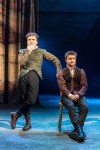David Leveaux: Tom Stoppard's plays aren't 'all head and no heart'
As his production of ”Rosencrantz and Guildenstern Are Dead” opens in London, British director David Leveaux explains how he approaches the plays of Tom Stoppard
During previews of our production of Tom Stoppard‘s Jumpers at the National Theatre a few years ago, Tom mentioned to me that he thought of 'laughter as the sound of comprehension'. Typically, the observation was simultaneously practical and almost incidentally philosophical: in this case it was sparked by a tricky issue of rhythm in a moment of staging which needed to be spot on to land a laugh. But the grace of his phrase instantly conjured something deeper.
By the time we began rehearsals for the production of Rosencrantz and Guildenstern Are Dead that is now at the Old Vic – the fourth of Tom’s plays I’ve directed with him alongside – I’d become pretty well alerted to two key characteristics of Stoppard plays: they obviously require enormous precision with the language and staging, but they will also leave the room if 'dazzle' is all you’ve got to show.
The nostrum that Stoppard was 'all head and no heart' proves itself to be entirely false
I realise this is a rather unoriginal truth about the theatre – or life – as much as it is about Stoppard specifically. Yet, it’s significant to me because what I’ve learned by frequently falling on my face in the rehearsal room when it comes to his plays is also the very thing that so draws me to them and to his special theatre. And that is this:
As a rule there seem to me to be at least two related but independent rhythms operating simultaneously in his plays. Two 'metabolisms' almost. And I think you ignore one at the expense of the other to your peril.
On the startling surfaces there is a joy of language, bumper cars of words spinning off to form new collisions and patterns and possibilities. (I believe Peter Brook once described A Midsummer Night’s Dream as 'language colliding in the air'. But even if he didn’t I think the phrase also stands up pretty well for Stoppard.) This 'surface' rhythm is a technical and practical challenge, requiring comprehension and breath and timing among other things. And Tom’s point, once in our rehearsal for Arcadia, that 'wit has a stalling speed' is precisely evocative of what pilots refer to as 'coffin corner' – when a plane is at such an altitude that the speed difference between going too fast and breaking up (incomprehensible) or going too slow and falling out of the sky (unfunny) is a matter of only a few knots either way.
But it’s the other rhythm within his plays that I think is so elusive and critical. And that is where the old nostrum that Stoppard – particularly in the early plays – was 'all head and no heart' quickly proves itself to be entirely false. Not to say useless in the reality of trying to stage them.
In his plays there always comes a moment where words literally fail
Once, during rehearsal for The Real Thing, I probably rather glibly described the play as Tom’s memo to himself about the limits of language. But what I meant was that there comes a moment in that play where words literally fail. And love, painful love, seeps indelibly up through the silent wreckage of language. And in Rosencrantz and Guildenstern the gathering pulse of mortality itself seems to surge up almost without warning – despite the sheer fun (and sometimes anarchy) of the hurtling, youthful comedy.
This other 'rhythm' is never quite the same in any of the plays of course. But my sense of it is that it can be expressed as a kind of utter silence sitting at the heart of all the movement and the words and laughter. And it is this that one has to somehow get at and make present, because it contains the miraculous human dimension of Stoppard’s theatre. The still place of bewilderment, innocence, awe, strangeness and suddenness.
The hare and the tortoise crop up quite a lot in Stoppard’s landscape. The flashy athlete and his relentlessly gradual, quiet competitor. I think it’s something to do with Tom’s deep originality that his plays subvert the original fable to insist that the hare and the tortoise cross the finishing line at exactly the same moment. Which means they must both be travelling at the speed of silence.
By David Leveaux
Rosencrantz and Guildenstern Are Dead runs at The Old Vic Theatre until 29 April.














